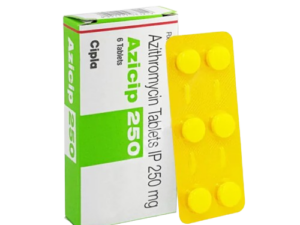Description
| Active Ingredient (Generic Name): | Azithromycin |
| Indication: | Bacterial infections |
| Manufacturer: | Cipla Ltd |
| Packaging: | 3 Tablets in 1 Strip |
| Strength: | 500 MG |
| Delivery Time: | 6 To 15 days |
| SKU: | Azicip 500 Mg |
Azicip 500 mg is a brand of Azithromycin 500 mg, an antibiotic manufactured by Cipla Ltd. It is widely used to treat various bacterial infections due to its broad-spectrum activity and convenient dosing regimen.
Uses of Azicip 500 mg
Azicip 500 mg is prescribed for treating bacterial infections, including:
- Respiratory tract infections: such as pneumonia, bronchitis, sinusitis, and pharyngitis/tonsillitis.
- Ear infections: like acute otitis media.
- Skin and soft tissue infections: including cellulitis and impetigo.
- Sexually transmitted infections: such as chlamydia and gonorrhea.
- Other infections: like urethritis, cervicitis, and certain eye infections.
How It Works
Azicip 500 mg contains azithromycin, a macrolide antibiotic that works by inhibiting bacterial protein synthesis, thereby preventing bacteria from growing and multiplying.
Dosage and Administration
- Adults: Typically, a single 500 mg dose on the first day, followed by 250 mg once daily for 4 more days.
- Children: Dosage is based on body weight and the specific infection.
Azicip 500 mg should be taken orally, preferably 1 hour before or 2 hours after meals, to enhance absorption.
Common Side Effects
Most side effects are mild and temporary, including:
- Nausea and vomiting
- Stomach pain or cramps
- Diarrhea
- Headache
- Dizziness or fatigue
- Rash
If any side effect persists or worsens, consult your doctor promptly.
Serious Side Effects
Serious side effects are rare but can include:
- Severe allergic reactions (e.g., rash, itching/swelling, difficulty breathing)
- Liver problems (e.g., yellowing of the skin or eyes)
- Heart rhythm disturbances (e.g., fast or pounding heartbeats)
- Severe diarrhea
Seek immediate medical attention if you experience any of these symptoms.
Precautions
- Allergy: Avoid if allergic to azithromycin or other macrolide antibiotics.
- Liver or kidney disease: Use with caution; dosage adjustments may be necessary.
- Pregnancy: Consult your doctor before use.
- Breastfeeding: May pass into breast milk; consult your doctor.
- Drug interactions: Inform your doctor about all medications you’re taking, as azithromycin can interact with certain drugs.
1. What is Azicip 500 mg used for?
Azicip 500 mg (Azithromycin) is used to treat various bacterial infections, including:
- Respiratory infections (e.g., pneumonia, bronchitis, sinusitis)
- Ear infections (e.g., otitis media)
- Skin infections (e.g., cellulitis, impetigo)
- Sexually transmitted infections (e.g., chlamydia, gonorrhea)
- Other infections like tonsillitis, conjunctivitis, and whooping cough.
2. How does Azicip 500 mg work?
Azicip 500 mg is a macrolide antibiotic. It works by inhibiting bacterial protein synthesis, preventing bacteria from growing and multiplying, which helps to eliminate the infection.
3. How should I take Azicip 500 mg?
Azicip 500 mg should be taken orally, typically once daily. It can be taken with or without food, but it’s recommended to take it at the same time each day to help remember your dose. Follow your doctor’s instructions carefully for dosage and duration of treatment.
4. What should I do if I miss a dose of Azicip 500 mg?
If you miss a dose, take it as soon as you remember, unless it’s almost time for your next dose. Do not take two doses at once to make up for a missed dose.
5. Can I stop taking Azicip 500 mg once I feel better?
No, you should finish the full course of treatment as prescribed, even if you feel better before completing it. Stopping early can result in the infection returning or contribute to antibiotic resistance.




